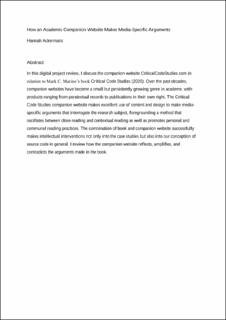| dc.contributor.author | Ackermans, Hannah | |
| dc.date.accessioned | 2021-01-05T11:30:06Z | |
| dc.date.available | 2021-01-05T11:30:06Z | |
| dc.date.created | 2020-12-26T15:42:59Z | |
| dc.date.issued | 2020 | |
| dc.Published | American Quarterly. 2020, 72 (4), 1011-1020. | en_US |
| dc.identifier.issn | 0003-0678 | |
| dc.identifier.uri | https://hdl.handle.net/11250/2721449 | |
| dc.description.abstract | In this digital project review, I discuss the companion website CriticalCodeStudies.com in relation to Mark C. Marino’s book Critical Code Studies (2020). Over the past decades, companion websites have become a small but persistently growing genre in academe, with products ranging from paratextual records to publications in their own right. The Critical Code Studies companion website makes excellent use of content and design to make mediaspecific arguments that interrogate the research subject, foregrounding a method that oscillates between close reading and contextual reading as well as promotes personal and communal reading practices. The combination of book and companion website successfully makes intellectual interventions not only into the case studies but also into our conception of source code in general. I review how the companion website reflects, amplifies, and contradicts the arguments made in the book. | en_US |
| dc.language.iso | eng | en_US |
| dc.publisher | Johns Hopkins University Press | en_US |
| dc.title | How an Academic Companion Website Makes Media-Specific Arguments | en_US |
| dc.type | Journal article | en_US |
| dc.type | Peer reviewed | en_US |
| dc.description.version | acceptedVersion | en_US |
| dc.rights.holder | Copyright 2020 The American Studies Association | en_US |
| cristin.ispublished | true | |
| cristin.fulltext | postprint | |
| cristin.fulltext | postprint | |
| cristin.qualitycode | 2 | |
| dc.identifier.doi | 10.1353/aq.2020.0057 | |
| dc.identifier.cristin | 1863277 | |
| dc.source.journal | American Quarterly | en_US |
| dc.source.40 | 72 | en_US |
| dc.source.14 | 4 | en_US |
| dc.source.pagenumber | 1011-1020 | en_US |
